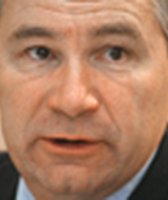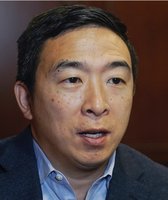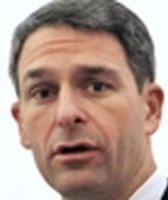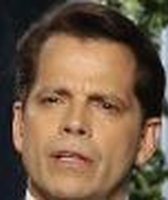Get PolitiFact in your inbox.
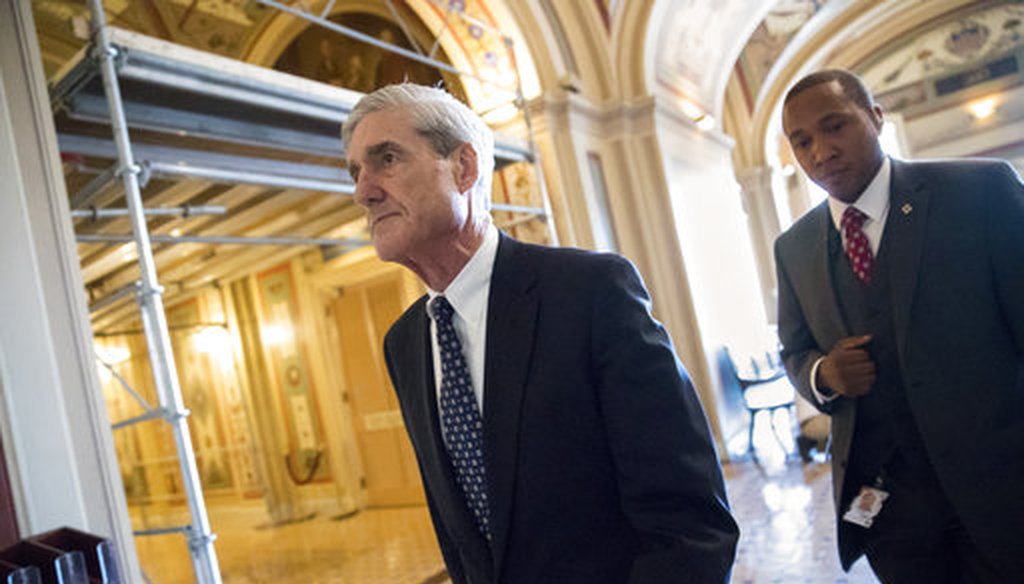
Special counsel Robert Mueller departs after a closed-door meeting with members of the Senate Judiciary Committee on June 21, 2017. (AP/J. Scott Applewhite)
Fox News legal analyst Gregg Jarrett’s The Russia Hoax reads like a book-length friend-of-the-court brief, painting a sympathetic portrait of the Trump presidency and defending the Trump team’s election-era actions, which are now under a microscope.
The book, which is among an emerging genre of pro-Trump nonfiction, skyrocketed up the bestseller list after Trump promoted the flattering read to his more than 53 million Twitter followers.
Congratulations to @GreggJarrett on The TREMENDOUS success of his just out book, “The Russia Hoax, The Illicit Scheme To Clear Hillary Clinton & Frame Donald Trump.” Already number one on Amazon. Hard work from a brilliant guy. It’s the Real Story of the Rigged Witch Hunt!
— Donald J. Trump (@realDonaldTrump) August 2, 2018
In defending Trump, Jarrett makes a number of claims that raised our eyebrows. We decided to take a closer look at some of his more salient points, some of which we’ve checked before.
Special Counsel Robert Mueller has been tasked to investigate, among other things, possible ties or coordination between the Trump campaign and Russian officials.
Jarrett may be technically correct when he says the word "collusion" does not appear in a relevant criminal statute. But this is highly misleading, given that the presence or absence of the word "collusion" fails to reflect the true reach of the criminal code. (We previously rated Jarrett’s claim False.)
Legal experts told us there are at least four laws that would prohibit the sort of activities under investigation, whether those laws mention collusion or not.
For example, federal law prohibits a foreign national from giving anything of value to a campaign engaged in a U.S. election. It’s also a crime to solicit a foreign national to do so, or even to "knowingly provide substantial assistance" in receiving something of value.
Legal experts pointed us to this statute after it was first learned that Donald Trump Jr., Paul Manafort and Jared Kushner met with a Russian national and several others at Trump Tower during the election, based on an offer that a "Russian government attorney" would deliver damaging information about Clinton. (It should be noted that experts cautioned against drawing any hard legal conclusions while Mueller’s investigation continues.)
By focusing on a single word — "collusion" — Jarrett is arguing semantics, not substance.
Jarrett and fellow Fox News host Jeanine Pirro both claim in new books about the Trump presidency that the collusion investigation is effectively dead.
The evidence? A key omission from a special counsel indictment in February of more than a dozen Russians: namely, the fact that no charges were filed against Americans.
"The notion that anyone in the Trump campaign had somehow been complicit was dispelled when the indictment of 13 Russians revealed that no Americans knowingly participated," Jarrett writes.
Given that Mueller’s investigation is ongoing, this assertion is premature.
Under the regulations that govern special counsel investigations, Mueller’s probe will end with a "confidential report explaining the prosecution or declination decisions" to the attorney general. There is no suggestion Mueller has submitted his final report yet, meaning the investigation is still active.
To date, the investigation has swept up four members of Trump’s campaign, including three who have agreed to work with with the special counsel as part of a plea deal.
As our timeline of the Mueller probe makes clear, the investigation has continued to evolve since February, when Jarrett claims the collusion probe ended.
On July 13, the special counsel indicted 12 Russian intelligence officers for their role in the hacking of the Democratic National Committee, the Democratic Congressional Campaign Committee and the Clinton campaign, and the leaking of emails and documents.
The indictment made reference to an unnamed U.S. person who "was in regular contact with senior members of the presidential campaign of Donald J. Trump," and who communicated during the election with Guccifer 2.0, a front for Russian operatives.
Former Trump campaign adviser Roger Stone acknowledged he is "probably" the U.S. person referenced in the indictment. Stone’s acknowledgement came five months after Jarrett claimed the collusion investigation had ended.
While testifying to the Senate Intelligence Committee on June 8, 2017, Comey used the words "salacious and unverified" to refer to parts of a dossier about Trump and Russia.
As a brief recap, the Clinton campaign and DNC during the 2016 election, through third-party intermediaries, hired a former British intelligence officer Christopher Steele to conduct opposition research on then-candidate Trump. Steele’s memos detailing explosive, though not fully verified, claims about Trump are known collectively as the Steele dossier.
Law enforcement agencies relied on the information, to some degree, to obtain a wiretap on a former Trump campaign adviser.
"The ‘dossier,’ which Comey confessed was ‘salacious and unverified,’ was their (...) ‘smoking gun,’ " Jarrett writes.
But that’s misleading. Comey’s careful phrasings in four portions of his testimony — which we’ve parsed here — indicate that he was not referring to the entire documents, only certain portions. And far from "confessing," Comey readily volunteered that prurience and uncertainty enshrouded some of the dossier's elements.
One example of Comey’s use of the phrase "salacious and unverified" came from his prepared testimony:
"I first met then-President-Elect Trump on Friday, January 6 in a conference room at Trump Tower in New York. I was there with other Intelligence Community (IC) leaders to brief him and his new national security team on the findings of an IC assessment concerning Russian efforts to interfere in the election. At the conclusion of that briefing, I remained alone with the President-Elect to brief him on some personally sensitive aspects of the information assembled during the assessment.
"The IC leadership thought it important, for a variety of reasons, to alert the incoming President to the existence of this material, even though it was salacious and unverified. Among those reasons were: (1) we knew the media was about to publicly report the material and we believed the IC should not keep knowledge of the material and its imminent release from the President-Elect; and (2) to the extent there was some effort to compromise an incoming President, we could blunt any such effort with a defensive briefing."
In this passage, Comey seems to apply the terms "salacious and unverified" to "this material," which in turn refers to the earlier reference to "some personally sensitive aspects of the information assembled during the assessment."
At the very least, this passage doesn’t suggest it’s a slam dunk that the entire dossier is "salacious and unverified." It refers to "some potentially sensitive aspects" of the dossier.
While heading the FBI, Comey made detailed notes following seven encounters with Trump. After his firing, he set in motion leaks to the press revealed portions of his memos to the public.
According to Jarrett, Comey’s leak "constituted an apparent crime."
The question of whether Comey’s leaks were improper is being probed by the Justice Department Inspector General. When President Donald Trump wondered if Comey’s actions were "totally illegal," several legal experts we spoke to said they were not.
"It absolutely is legal for Comey to share his own private reflections that do not consist of closely held national security secrets with the press, whether by passing on the information himself or through a friend," said Heidi Kitrosser, a law professor at the University of Minnesota.
Experts said the Espionage Act would not apply because the memos did not contain closely held national security information. They also pushed back on the argument that Comey had disclosed privileged information. Executive privilege can block disclosure of certain communications in an evidentiary proceeding, we’re told, but not in discussions with the press.
But one legal expert, Jonathan Turley, a law professor at George Washington University, said there’s something to the argument that Comey had improperly treated the memos as personal property, when they actually belonged to the U.S. government.
Turley said Comey is unlikely to face criminal charges, but he could be found in violation of professional standards.
Critics of Mueller’s probe have long argued that the FBI’s original investigation was based on false pretenses. We rated it False when Trump claimed the Steele dossier launched the Russia probe.
It was Trump adviser George Papadopoulos who triggered investigation.
But you wouldn’t know that from Jarrett’s book.
"It is more likely that the Papadopoulos conversations were not the impetus for the Trump-Russia ‘collusion’ case, but something else," he writes.
In fact, the federal government started looking into Russian election involvement in July 2016 based on information from Papadopoulos. This was confirmed by Republican members of the House Intelligence Committee.
"The Papadopoulos information triggered the opening of an FBI counterintelligence investigation in late July 2016 by FBI agent Pete Strzok," the House Intelligence Committee’s GOP members wrote in a Feb. 2 memo. (This was confirmed in a subsequent April report.)
So, what was the "Papadopoulos information"?
According to the New York Times, Papadopoulos told a high-ranking Australian diplomat at an upscale London bar in May 2016 that Moscow had "political dirt" on Hillary Clinton. Australian officials relayed this information to their American counterparts.
Asked for comment on this story, Jarrett replied, "The facts and the law presented in my book, The Russia Hoax, are well sourced. I stand by my interpretations and conclusions drawn therefrom."
Our Sources
PolitiFact, "Fox News host wrong that no law forbids Russia-Trump collusion," May 31, 2017
PolitiFact, "What legal experts say about Donald Trump Jr. meeting with Russian lawyer," July 11, 2017
PolitiFact, "Jeanine Pirro’s new book falsely declares the Russia investigation over," July 25, 2018
PolitiFact, "Nunes memo twists James Comey's words on Steele dossier," Feb. 5, 2018
PolitiFact, "Donald Trump: Comey's leak of memo 'totally illegal?' " June 11, 2017
PolitiFact, "Donald Trump falsely says new Carter Page documents show Steele dossier launched Russia probe," July 23, 2018


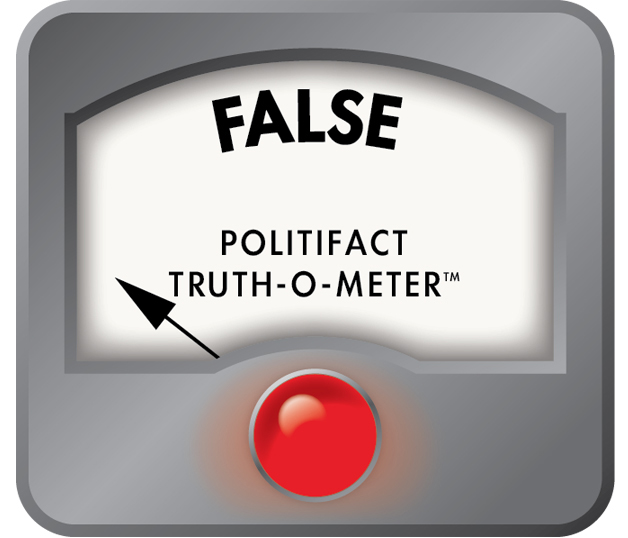 PolitiFact Rating:
PolitiFact Rating: 

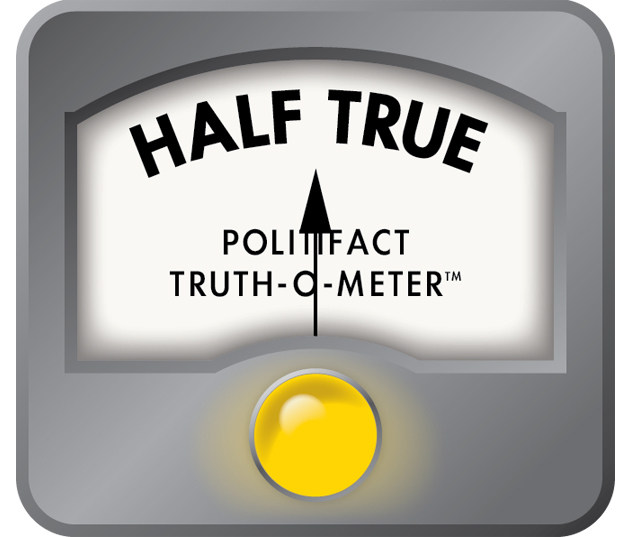 PolitiFact Rating:
PolitiFact Rating: 














